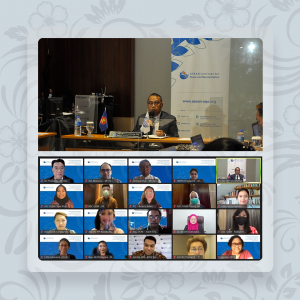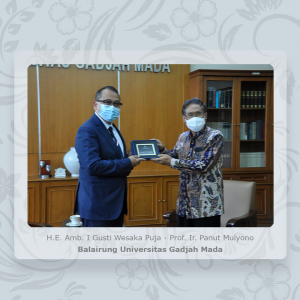Ambassadorial Lecture “Improving the Implementation of ASEAN Charter” with H.E. Amb. Noel Servigon
This year remarks the 15 years of implementation of the ASEAN Charter that was adopted at the 13th ASEAN Summit in November 2007. In fact, the draft of the ASEAN Charter as the constituent instrument of the association had been formally proposed in 2005 at the 11th ASEAN Summit in Kuala Lumpur, Malaysia. Until now, the ASEAN Charter remains strongly considered as the basic instrument for ASEAN and member countries informing policies and decisions on the regional contexts and issues.
ASEAN Studies Center UGM in cooperation with the Permanent Mission of the Philippines to ASEAN successfully held an Ambassadorial Lecture on Friday, 21st January 2022, entitled “Improving the Implementation of the ASEAN Charter”. The lecture was moderated by Ms. Yulida Nuraini Santoso, the Managing Director of the Center, and invited H.E. Ambassador Noel Servigon as the Permanent Representative of the Philippines to ASEAN to deliver the lecture as the main speaker.
In his speech and presentation, Ambassador Noel addressed, through the years the ASEAN Charter has guided the association in various activities. On its implementation, there were several attempts to review the implementation and the provisions of the ASEAN Charter and amend certain portions of the charter back in 2017 in Philippine ASEAN Chairmanship and 2020 in Vietnam ASEAN Chairmanship. Ambassador Noel stated that ASEAN Charter is a living document that must continuously be improved, both in its context as well as in its implementation.
Based on his experience, Ambassador Noel pointed out certain provisions of the charter that needs to be implemented further, he highlighted several provisions on ASEAN Summit, ASEAN Coordinating Council, ASEAN Foreign Ministers Meeting, ASEAN Community Councils, ASEAN Sectoral Ministerial Bodies, ASEAN Senior Officials Meeting, ASEAN Committee of Permanent Representatives, ASEAN Secretary-General and the ASEAN Secretariat, and lastly is ASEAN Chairman.
The lecture was continued with the Q&A session with the participant and was moderated by Ms. Yulida. The session collected several questions to be addressed by Ambassador Noel, including the question from H.E. Ambassador Will Nankervis, the Ambassador of Australia to ASEAN.
At the end of the lecture, Ambassador Noel addressed the closing speech that he hopes through this kind of webinar and public lecture, ASEAN able to be brought closer to the people in ASEAN Member Countries. These kinds of events managed to raise the awareness and deeper understanding of ASEAN and its charter so that the ASEAN as a regional organization could fulfill the goal of behaving in a rules-based community.
Report by:
- Syukron Subkhi Media and Publication Officer

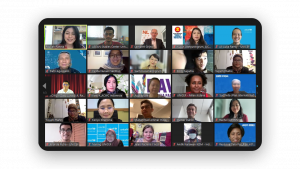 The discussion highlighted a number of issues including the role of CSOs and the academic community which is to support the State in undertaking the obligation as duty bearer in fulfilling the rights of Children, to contribute to CRC Alternative Report CRC in order to support the government efforts on implementing CRC including ensuring child participation, to undertake research on the situation and well-being of women and children, and contribute on implementing Concluding Observation of CRC beneficial as foundation works on measures to child rights realizations.
The discussion highlighted a number of issues including the role of CSOs and the academic community which is to support the State in undertaking the obligation as duty bearer in fulfilling the rights of Children, to contribute to CRC Alternative Report CRC in order to support the government efforts on implementing CRC including ensuring child participation, to undertake research on the situation and well-being of women and children, and contribute on implementing Concluding Observation of CRC beneficial as foundation works on measures to child rights realizations.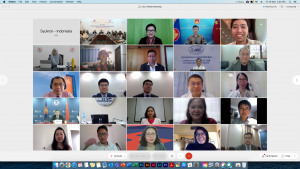 On a similar note, Dr. Nguyen Hung Son, the Vice President of Diplomatic Academy of Viet Nam (DAV), acknowledged that the forum could be a platform to discuss and comprehend each view on the Southeast Asia region’s development. On this occasion, the panel is expected to promote good relationships and bring prosperity to the parties. As an essential dialogue partner, a substantive partnership among NACT members is needed in order to construct ideal regional architecture. In regards to current challenges, the foundation of the cooperation must be based on responsibility and responsiveness.
On a similar note, Dr. Nguyen Hung Son, the Vice President of Diplomatic Academy of Viet Nam (DAV), acknowledged that the forum could be a platform to discuss and comprehend each view on the Southeast Asia region’s development. On this occasion, the panel is expected to promote good relationships and bring prosperity to the parties. As an essential dialogue partner, a substantive partnership among NACT members is needed in order to construct ideal regional architecture. In regards to current challenges, the foundation of the cooperation must be based on responsibility and responsiveness.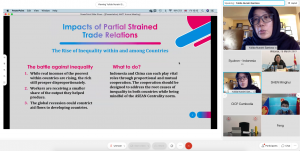 The meeting was concluded with a hope to enhance mutual trust and understanding between China and ASEAN member states, as well as exchanging knowledge and perspective to ensure stability, resilience, and development in the region.
The meeting was concluded with a hope to enhance mutual trust and understanding between China and ASEAN member states, as well as exchanging knowledge and perspective to ensure stability, resilience, and development in the region.
